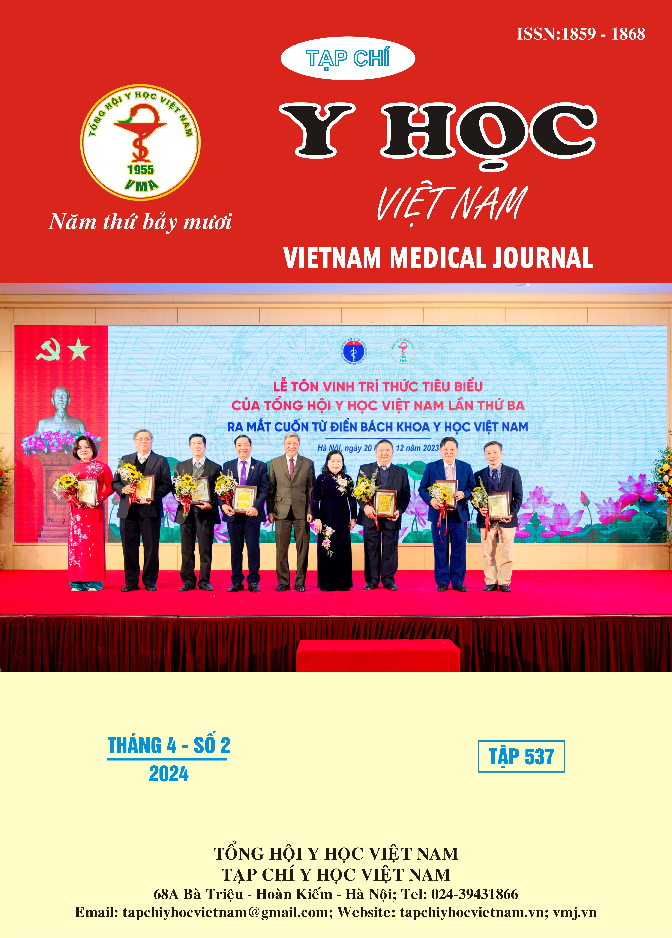CHARACTERISITCS OF THE CORNEAL ENDOTHELIUM IN PATIENTS WITH PSEUDOEXFOLIATION SYNDROME
Main Article Content
Abstract
Purpose: To investigate epidermoloy, clinical characteristics, and corneal endotelial cells’ parameters in PEX patients. Methods: Cross-sectional study. 100 eyes were separated into 2 groups, with 50 eyes in the PEX group and 50 eyes in the normal group. Patients were examined, and information about epidermology and clinical characteristics was collected. Then, patients were taken for corneal endothelial cell imaging with specular microscopy (NIDEK CEM 530). Results: Age and sex distributions are similar between groups. There was no statistically difference between the PEX and the normal group’s visual acuity, intraocular pressure, anterior chamber depth, and cataract grade parameters. The average endothelial cell density (ECD) of the PEX group was 2513,08 ± 435,94 cells/mm2 and the result for the normal group was 2669,26 ± 298,54 cells/mm2 (p = 0,043). Other endothelial cells’ parameters are similar between 2 groups. Conclusion: Patients presenting with PEX have a lower ECD than controls with similar epidemiological characteristics. Caution should be exercised during intraocular surgery in PEX patients to limit postoperative endothelial decompensation.
Article Details
Keywords
Pseudoexfoliation syndrome, endothelial cell density, specular microscopy.
References
2. Schlotzer-Schrehardt U. Genetics and genomics of pseudoexfoliation syndrome/glaucoma. Middle East Afr J Ophthalmol. 2011;18(1):30-6.
3. Naumann G. O., Schlotzer-Schrehardt U. Keratopathy in pseudoexfoliation syndrome as a cause of corneal endothelial decompensation: a clinicopathologic study. Ophthalmology. 2000;107(6):1111-24.
4. Sunita Chaurasia Murugesan Vanathi. Specular microscopy in clinical practice. Indian Journal of Ophthalmology. 2021;69(3):8.
5. Ken Hayashi Shin-ichi Manabe, Koichi Yoshimura, Hiroyuki Kondo. Corneal endothelial damage after cataract surgery in eyes with pseudoexfoliation syndrome. Cataract Refract Surg 2013;39:881-7.
6. Demircan S Atas M, Yurtsever Y. Effect of torsional mode phacoemulsification on cornea in eyes with/without pseudoexfoliation. Int J Ophthalmol. 2015;8(2).
7. Kuldar Kaljurand Pait Teesalu. Exfoliation Syndrome as a Risk Factor for Corneal Endothelial Cell Loss in Cataract Surgery. Annals of Ophthalmology. 2007;39:7.
8. Eren Ekİci Ali Keles, Süleyman Korhan Kahraman. Early Postoperative Effects of Uncomplicated Phacoemulsi¦cation Surgery on Corneal Endothelial Cells and Thickness in Patients with Pseudoexfoliation Syndrome. Research Square. 2021.
9. Hassan S. Yousef Ibrahim Amer, Shymaa A.A. Thabet. Specular microscopic changes of corneal endothelial cells after phacoemulsification in patients with pseudoexfoliation. Al-Azhar Assiut Medical Journal. 2022;20.
10. Vazquez-Ferreiro P., Carrera-Hueso F. J., Poquet Jornet J. E., Fikri-Benbrahim N., Diaz-Rey M., Sanjuan-Cervero R. Intraoperative complications of phacoemulsification in pseudoexfoliation: Metaanalysis. J Cataract Refract Surg. 2016;42(11):1666-75.


